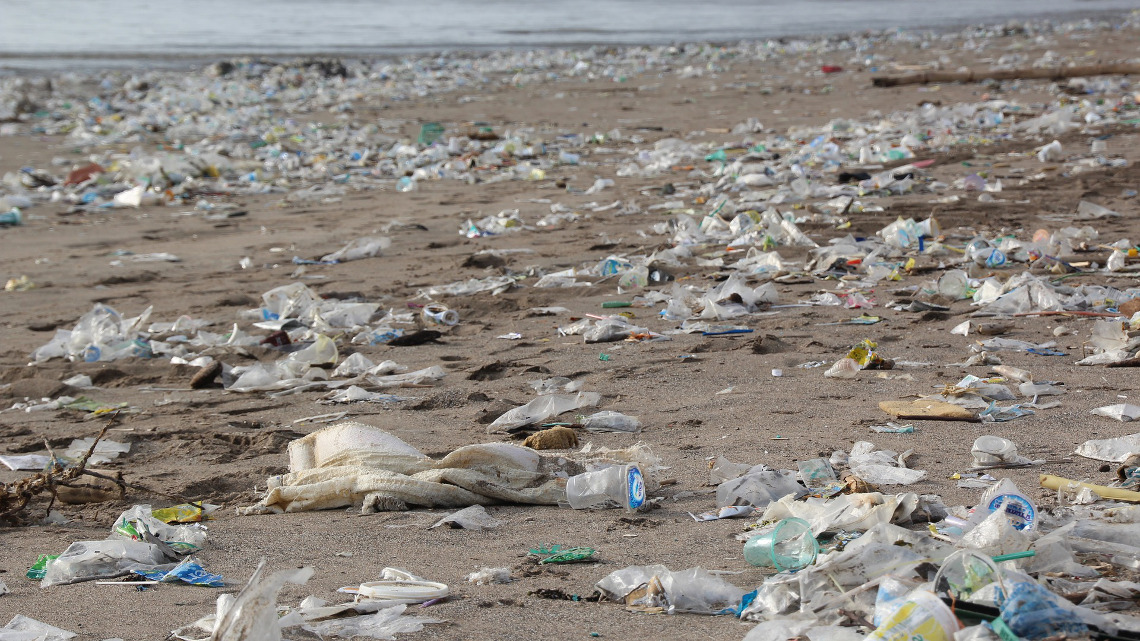Bioplastic degrades very slowly
An assessment by the Federal Environment Agency with the participation of Fraunhofer researchers states: Even biodegradable plastics remain in the environment for months.

Environmental pollution caused by plastic waste is a hot-button issue right now - whether it's waste islands in the oceans or microplastics in the fields which eventually end up in the intestines of humans. However, plastic packaging cannot be dispensed off everywhere. Thus, more and more biodegradable plastics are being produced, which are supposed to have less impact on the environment. Yet, although biodegradability might help against long-term littering, it could also lead to an even more careless handling of packaging waste, which would have an even greater impact on the environment.
The Federal Environment Agency has therefore commissioned a report in which materials, products and standards of biodegradability are described and the recovery of relevant waste in five EU member states is compared. In addition, scientific publications on the subject were evaluated. The result: even biodegradable materials remain in the environment for several months or even years. The 150-page manuscript was prepared by three researchers from the Fraunhofer Institute for Environmental, Safety and Energy Technology UMSICHT in Oberhausen together with three experts from BiPRO GmbH in Munich and is available online (German).
Microorganisms decompose plastics
According to the report, bioplastics makes up about 1.3% of the global plastics production - and growing. By definition, a plastic is biodegradable if it is decomposed into carbon dioxide, water, mineral salts and biomass by microorganisms with oxygen supply or if it can be converted into carbon dioxide, methane, mineral salts and biomass without oxygen supply. Of note: not all biobased plastics are biodegradable and not all biodegradable plastics are bio-based.
Degradation process can take up to two years
The biological degradation of polymers takes place in two stages: The first, speed-limiting step is the hydrolysis of the polymer chains into smaller fragments. These are usually water-soluble and can be absorbed and further degraded by cells. As the report shows, the polymers need at least six weeks up to almost two years to degrade, depending on the temperatures, the oxygen supply and whether they are degraded in the soil or in fresh or salt water.
Different approaches across EU
Throughout Europe there are different views and approaches regarding biodegradable plastics and their disposal. The report therefore also identified and compared the various strategies and disposal concepts. Here, the focus was on Germany, Italy, France, the Netherlands and Sweden. The product groups that are particularly relevant in Germany are mulch films, biowaste bags and plastic packaging. The main products used are biodegradable starch, polylactide (PLA), polybutylene succinate (PBS), polybutylene adipate terephthalate (PBAT) and polyhydroxyalkanoates (PHA).
Promoting financial incentives
According to the authors of the report, Italy and France have regulations that favour the use of biodegradable plastics. In France, for example, fruit and vegetable bags are required to be compostable and bio-based. And in Italy, disposable plastic bags must be industrially compostable and bio-based. Although the use of biodegradable plastics is also promoted in the Netherlands through financial incentives, there is no clear official regulation. The situation is similar in Germany and Sweden: According to the authors, there is a lack of financial incentives.
Call for legislative action
According to the assessment, the biological degradation of plastics is only advantageous if it provides an additional benefit. Otherwise, recycling would be economically and ecologically more valuable. Based on their analyses, the authors therefore give the following recommendations for Germany: "Leaving biodegradable mulch foils in the soil can be tolerated to a limited extent." Since the use of these foils has been fairly limited, the authors recommend to first focus on the possibility of recycling conventional (disposable) bags.
In contrast, biodegradable collection bags would "definitely support the collection of biowaste". For a successful and complete conversion to biodegradable plastic bags, however, clear labelling and comprehensive information for the public are important. Last but not least, the authors call on the legislators to provide more and better labelled biodegradable packaging materials: "In Germany, the extended producer responsibility also applies to packaging. Hence, it must be recycled in accordance with the Packaging Ordinance and, in the future, in accordance with the Packaging Act".
jmr


